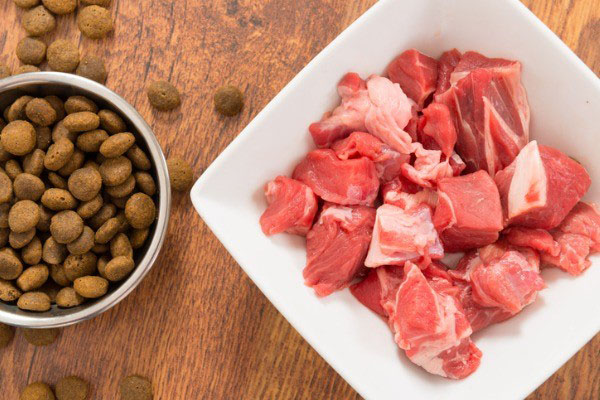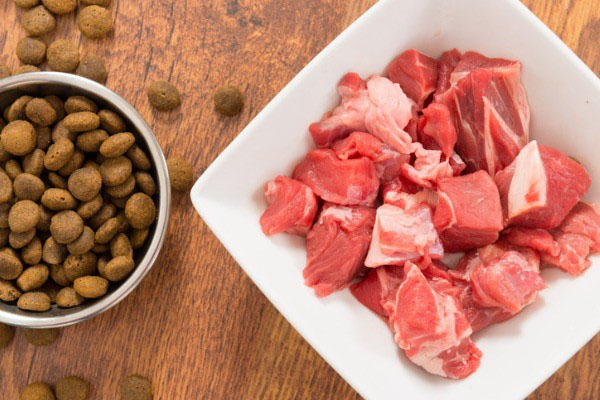Raw feeding pets versus feeding your pet a cooked or processed diet is always a debated topic but one thing scientists do know is that cooking food alters the food and it’s nutritional value is reduced.
Cooked food for both humans and pet’s alike, loses many of the essential nutrients the body requires for optimum health.
Your cat and dog’s body is designed by evolution to eat raw and if you’re not quite convinced that your pet should be eating raw then know that cooking meat effects it in a detrimental way by making it carcinogen (cancer causing).
When meats are cooked at high temperatures it changes the molecular structure of the protein to produce un-natural amino acids that kill off the real amino acid your pet’s body needs for nutrition. The new amino acids that develop from the heating process form a type of cross-linking of molecules that aren’t found in nature and that your pet’s body can’t break down. Meaning these start to build up as coagulated proteins or thickened masses.
This change to the protein structure reacts with the body to form heterocyclic amines or HCA’s. These then interfere with your pet’s genetic structure and are proven to be the cause of cancer.
Beef, Fish, Chicken and Pork can all change their molecular structure under heat to form HCA’s.
Effects of Heat on Protein
When proteins in meats are heated there is a complete destruction of some of the active enzymes that were present in the meat beforehand and which your pet needs as essential building blocks for good health. The real proteins which would have been bio-available for the body to use for functions such as oxygen transportation in cells for example, are no longer available.
Heat destroys essential amino acids, vitamins and minerals your cat or dog would normally obtain from eating raw meat. When you’re feeding processed or cooked foods, in order for your pet to get these necessary vitamins, minerals and amino acids they have to be added back in as chemical based supplements. Which again means they are not bio-available in their real format for basic body functions.
Cooked food also reduces the natural moisture content found in raw food. This is a huge factor in animals developing health issues, especially cats. They physically can’t drink all their requirement for water. Their bodies have been designed to gather moisture from raw feeding and the essential item of moisture/water content has been sucked out of the food through any cooking process.
The same goes for dogs but to a much lesser extent. They have the ability to drink more than cats but their bodies have been designed to absorb a certain level of moisture from raw food. By feeding your cat or dog cooked or processed food means you’re inhibiting your pet’s ability to draw on the maximum moisture requirement needed for good health. If your dog is always thirsty is because it’s suffering from the lack of moisture in it’s food. Raw fed dogs and cats don’t have this problem.
When looking at cooked or processed foods both for humans and pets, one of the big unknowns still is, which micro vitamins and minerals that the body requires and that haven’t been discovered yet, are being eliminated through the cooking process? But these would still be present and accessible to the body to draw on from raw food.
Scientists do know that eating more whole food or raw food is the way to optimum health and that it is possible with whole food to feed either yourself or your pet out of disease. The problem is that the larger forces at play such as profit, and the money received from medication or procedures means sadly vets get paid and rewarded for your pet’s ill-health rather than long term health.
You have control over what you eat so you can opt to eat more raw food to improve your health, but your pet is solely reliant on you for it’s food. The big question then is, are you feeding your pet into dis-ease or are you electing to give your cat or dog optimum health be allowing it access to raw food?
Is your pet’s body being starved of the real nutrition it needs because you’re opting to feed it cooked or processed food, inline with what your vet recommends and not what nature intended?
Nutrition is everything to health. Cooking proteins eliminate the natural molecular structures changing them into carcinogenic structures. Over time this fundamentally impacts your pet’s DNA. Read more about the impacts of food on your pet’s genotype here.
Cooked Proteins Become “Toxic”
Raw protein has simple amino acid structures the body can readily use. When the new molecular structures are created through cooking proteins, the body struggles to recognise the protein as food. The cooked food has a much longer digestive time in your pet and prevents normal bi-chemical reactions in the body. Basically, your dog or cat’s digestive juices and enzymes can’t break these amino acids structures that are created through cooking, down. The consequence of which, is digestive leukocytosis.
Digestive leukocytosis is where the body thinks the cooked food is an infection so starts to produce white blood cells to fight this “unknown”. This negatively impacts your pet’s immune system as it’s energy is being used to digest food and protect the body against something eaten as opposed to functioning effectively and as it should.
Digestive leukocytosis does not occur in raw feed pets as the raw food aids the enzymes in digestion. Cooked food destroys the enzymes making it more difficult for the body to utilize. The coagulated proteins that build up through feeding your pet cooked or processed proteins are one of the main causes of issues such as allergies, auto-immune deficiencies and inflammation, to name but a few.

Raw Feed Pets v Cooked or Kibble fed Pets.
In numerous studies of dogs or cats fed a cooked or processed diet compared to those pets raised on raw or fed a raw diet, the following variants in health were found:
Animals fed on cooked and processed proteins suffer from:
- Less bone density. Raw feed pets have 2 to 3 times more calcium and phosphorous in their bones.
- Heart disease issues
- Obesity
- Leaky gut syndrome
- Longer intestinal tracts that lack tone and elasticity. Raw feed cat’s for example, have a normal intestinal tract length of 48″ with good tone and elasticity compared with cooked fed cats intestinal tract length at 72-80″ that lacks tone and elasticity.
- Eye issues
- Thyroid problems
- Kidneys problems
- Respiratory system problems
- Cancer
- Unhealthy teeth and gums, with most pet’s suffering from gum disease or some loss of teeth by the time they are 6 years old.
- Problems with arthritis
- Suffer with parasite infestation
- Have serious allergies
- Behavior problems
- Accelerated ageing
- Liver degeneration
- Enlarged pancreatic issues
- Weakened immune system
- Stagnant Lymph system
- Putrefied intestines through the build up of unhealthy intestinal flora.
- Nutritional deficiency or malnutrition of essential nutrients.
Rarely do these issues present in raw fed dogs or cats. The more the food is cooked the less healthy your pet is. Through numerous studies it’s evident that animals feed on cooked food continue to deteriorate in health compared to raw feed pets. Raw feed pets need very little if any veterinary care.
What’s the take away from all this? Heating makes the molecules in food do weird things that don’t contribute to good health. Cooking destroys the original properties found in food that your pet needs for basic biological activity.
Interestingly enough one of the healthiest nations in the world, the Japenese, thrive on raw food. Take a leaf out their book and choose health for happiness for both you and your pet by going raw. Raw feeding is not a new discovery for the Japanese, it’s been around for thousands of years and successfully so as they have some of the lowest rates of illness and disease in the world.

